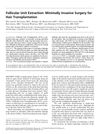 July 2021 in “British Journal of Dermatology”
July 2021 in “British Journal of Dermatology” Low testosterone levels may contribute to female pattern hair loss in men.
 17 citations,
July 2018 in “International Journal of Cosmetic Science”
17 citations,
July 2018 in “International Journal of Cosmetic Science” Keratin-based particles safely improve hair strength, smoothness, and heat protection.
 21 citations,
April 2019 in “Clinical, cosmetic and investigational dermatology”
21 citations,
April 2019 in “Clinical, cosmetic and investigational dermatology” The document concludes that stopping shaving or removing affected hair can alleviate Pseudofolliculitis barbae (PFB).
16 citations,
January 2010 in “Springer eBooks”  16 citations,
April 2007 in “Journal of Medical Primatology”
16 citations,
April 2007 in “Journal of Medical Primatology” The monkey's hair loss was due to an autoimmune disease, not genetics.
 15 citations,
August 2015 in “Scanning”
15 citations,
August 2015 in “Scanning” Corkscrew and cigarette-ash-shaped hairs in tinea capitis are caused by internal hair degradation and external resistance.
 13 citations,
August 2002 in “Dermatologic Surgery”
13 citations,
August 2002 in “Dermatologic Surgery” FUE is a less invasive hair transplant method suitable for many patients, but it has limitations and may not replace traditional techniques.
12 citations,
January 2015 in “Skin appendage disorders” Dermoscopy helps quickly identify hair breakage in people of African descent.
8 citations,
June 2020 in “Colloids and surfaces. B, Biointerfaces” Heating hair proteins changes their structure and may improve their blood clotting ability.
 5 citations,
September 2022 in “Journal of Investigative Dermatology”
5 citations,
September 2022 in “Journal of Investigative Dermatology” Careful selection of mice by genetics and age, and controlled housing conditions improve the reliability of hair regrowth in wound healing tests.
 March 2021 in “bioRxiv (Cold Spring Harbor Laboratory)”
March 2021 in “bioRxiv (Cold Spring Harbor Laboratory)” Removing a specific gene in certain skin cells causes hair loss on the body by disrupting normal hair development.
 July 2013 in “Hair transplant forum international”
July 2013 in “Hair transplant forum international” Dr. James Harris successfully incorporated Follicular Unit Extraction into his hair restoration practice, offering more surgical options and achieving natural results with the help of a team approach.
 May 2024 in “Proteome science”
May 2024 in “Proteome science” Bleaching damages hair by reducing the quality of keratin and keratin-associated proteins.
February 2024 in “Medicina” AFM can diagnose hair disorders by revealing detailed hair surface changes.
July 2022 in “Indian Journal of Otology” A rare ear-area hair cyst was successfully removed from a 10-year-old boy.
 January 2015 in “Hair therapy & transplantation”
January 2015 in “Hair therapy & transplantation” New hair and scalp disease diagnosis methods are important for correct treatment.
 1 citations,
January 2024 in “Scientific reports (Nature Publishing Group)”
1 citations,
January 2024 in “Scientific reports (Nature Publishing Group)” Human hair was used to make biodegradable plastic films that could be useful for packaging and disposable products.
8 citations,
May 2020 in “International journal of biological macromolecules” Certain treatments can increase protein binding to natural hair but are less effective on permed hair.
 January 2018 in “Springer eBooks”
January 2018 in “Springer eBooks” Different races and genders have unique skin and hair issues, requiring specialized care and more research for effective treatment.
 January 2023 in “Pesquisa Veterinária Brasileira”
January 2023 in “Pesquisa Veterinária Brasileira” A KRT71 mutation in Hereford cattle in Uruguay causes thin, curly hair and scaly skin.
34 citations,
December 2009 in “Journal of the American Academy of Dermatology” Improper use of ceramic flat irons can cause severe hair damage.

A Moroccan athlete got a rare scalp infection, stressing the need for better hygiene in sports.
 243 citations,
September 2016 in “Dermatology and Therapy”
243 citations,
September 2016 in “Dermatology and Therapy” Dermoscopy is a useful tool for identifying features of skin conditions, but more research is needed to define its role in dermatology.
 36 citations,
October 2016 in “Medical mycology”
36 citations,
October 2016 in “Medical mycology” PCR-ELISA is better for identifying the fungus causing scalp infections in Ugandan children than traditional methods.
December 2008 in “The Internet journal of surgery” A 16-year-old girl with a hair-eating disorder needed surgery to remove a hairball from her stomach and small bowel.
 22 citations,
June 1980 in “International Journal of Dermatology”
22 citations,
June 1980 in “International Journal of Dermatology” The document concludes that correct diagnosis of alopecia types is crucial, scalp biopsies are important, and more research is needed.
 38 citations,
July 2010 in “Clinical, cosmetic and investigational dermatology”
38 citations,
July 2010 in “Clinical, cosmetic and investigational dermatology” To treat tinea capitis in children, oral antifungal medication is necessary, with newer drugs offering shorter treatment times than the traditional griseofulvin.
 53 citations,
February 2017 in “Journal of The American Academy of Dermatology”
53 citations,
February 2017 in “Journal of The American Academy of Dermatology” The conclusion is that high-potency steroids or tacrolimus are effective treatments for erosive pustular dermatosis of the scalp.
 4 citations,
September 2021 in “Dermatopathology”
4 citations,
September 2021 in “Dermatopathology” The conclusion is that Erosive Pustular Dermatosis of the Scalp is a rare condition best treated with strong topical steroids and sometimes systemic treatment.
 1 citations,
September 2023 in “International Journal of Dermatology”
1 citations,
September 2023 in “International Journal of Dermatology” Early detection and treatment of folliculitis keloidalis can prevent disease progression.






















